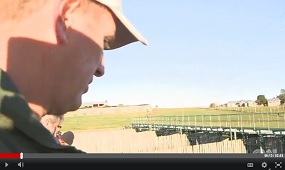Posted on June 12, 2015
The University of Pretoria (UP) is in a unique position that it is the only tertiary institution in the country that has a Faculty of Veterinary Science. The Faculty of Veterinary Science values its role and responsibility in conserving the environment. Through its academic programmes and research it is committed to promoting sustainability for a healthier environment. Public and animal health, biosecurity and welfare, disease control and animal production are just a few of the focus areas of the Faculty that promote a healthy thriving ecosystem and environment. The Faculty is a leading driver of the One Health concept within the Southern African Development Community (SADC), valuing the importance of a healthy human/animal/ecosystem interface. The severe impact of pollution on environmental, animal and human health throughout the world has highlighted the importance of ecosystem health. The Faculty maintains the best way to address these challenges is through the One Health Approach.
The Dean of the Faculty, Prof Darrel Abernethy, says the Faculty’s general approach to all teaching and research, particularly around livestock and wildlife, is orientated towards sustainability. Improving health and productivity of animals are two fundamental areas of focus, which not only improve areas of food security and income generation, but by focusing on animal health, issues such as diseases are minimised, which in turn benefits the environment.
The sustainable use of the Earth’s resources is a priority for the Faculty and it strongly endorses better utilisation of these valuable and finite resources. Combatting parasites and disease control in animals are just a few ways that resources are optimised. The Faculty’s work goes beyond the classroom doors. It offers farming programmes that aim to better equip small scale farmers with the knowledge of better farming practices, becoming more responsible environmental stewards while improving their farming outputs.
The Faculty of Veterinary Science has dedicated staff and researchers working on focus areas that are affecting environments across Africa. Just some areas are mentioned below.
When an animal becomes extinct, the balances of an environment are disrupted and an ecosystem is threatened. The Veterinary Genetics Laboratory’s Dr Cindy Harper, developed the Rhino Index System (RhODIS), which houses DNA samples of thousands of dead, poached and live rhinos, in efforts to combat the war that is rhino poaching. RhODIS has had many successes in linking DNA found in rhino horn to specific poaching events. It also serves as valuable evidence in court. This system holds great promise in efforts to protect South Africa’s wildlife and Harper hopes to include lions and elephants into the project as well. Both these species are also fatally subjected to man’s greed and traditional beliefs. Harper says, ‘The idea is to have an international database of threatened species everyone in the world can use.’
Sewage pollution, heavy metals and other pollutants in our water systems are causing a grave depletion of life in our water systems. Because of the dirty waters, diseases are becoming more prevalent. Dr Jan Myburgh, of the Department of Paraclinical Sciences, is specifically researching ways to improve the health and welfare of the Nile crocodile. In 2008, the Kruger National Park was struck with a pansteatitis outbreak in crocodiles, resulting in the death of a large number of crocodiles. Pansteatitis is a physiological disease that causes extreme pain, loss of mobility and death.
Saving the Survivors was started by two of the Faculty’s veterinarians, Drs Johan Marais and Gerhard Steenkamp, in 2012 to specifically care for rhinos that have survived poaching and other traumatic incidents. Rhino survivors are estimated at between 80 and 120 animals per year, but the terrible truth is that as the demand for rhino horn continues to increase, so does the number of rhinos that survive these brutal attacks and are then in need of urgent attention and treatment. The formidable pair is regularly called out to game farms and nature reserves to treat injured rhinos. As all of the Faculty’s staff, they too are committed to saving species from extinction and endorsing a healthy thriving ecosystem.
The work of Drs Marais and Steenkamp has recently also been featured in the international media, with two reports on their remarkable efforts to save a rhino named Hope, that was the victim of poachers, having been broadcast on the international news channel CNN.
Click on the links below to watch the segments on CNN.
 |
Copyright © University of Pretoria 2025. All rights reserved.
Get Social With Us
Download the UP Mobile App